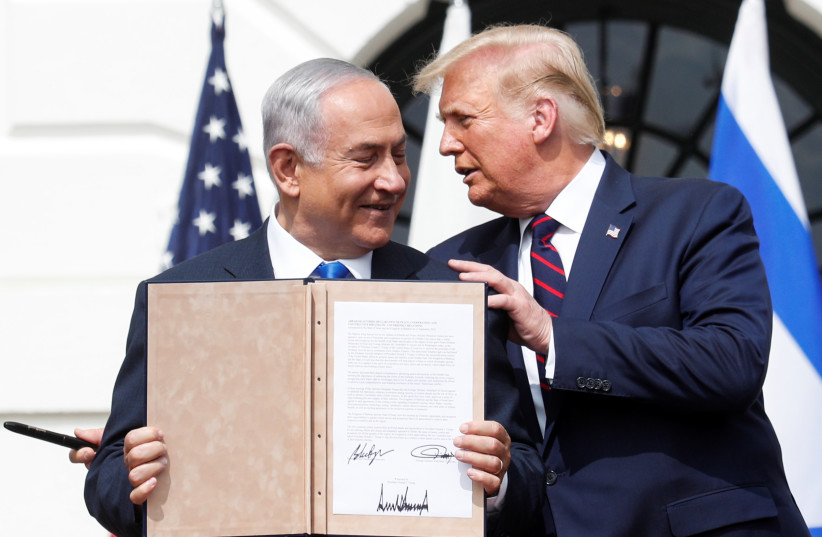The United Arab Emirates (UAE), Bahrain, Morocco, Sudan, and more recently Saudi Arabia and Oman have started to normalize their relations with Israel. The UAE, Bahrain, and Morocco signed full-fledged peace agreements, the Abraham Accords, that introduced formal economic and diplomatic relations.
In this new Arab-Israeli reality, the role of Western countries, particularly the United States, was pivotal. Despite the rebellion of some state and non-state actors, such as Iran and its proxies, the agreement has been accepted by governments and their populations alike as a new path for the Middle East.
However, despite its warm embrace in the region and just south of the border, and despite its former role as a peacekeeper in the region, Canada has been absent from all aspects, failing to latch onto the immense opportunity that the Abraham Accords bring with them.
From a security perspective, the Abraham Accords shift the historic dilemma based on identity and religion to one based on core elements of national security and international allies. In the previous paradigm, Arabism was the single and fundamental factor unifying Arabs against Israel.
Entire Arab regimes united around Arabism and formed alliances against Israel. The wars that plagued Israel’s earlier years (1948–49, 1956, 1967, 1973) occurred based on Arab nationalism as the core ideology, with the aim to wipe out the Jewish neighbor in their midst.
This dilemma then shifted from Arabism to religious fundamentalist Islamic factors, taking shape after the 1979 revolution in Iran, with Iran branding itself as the defender of Palestine. Iran and other Arab states elevated their profile from a narrow approach based on ethnicity to a broader approach based on Islam and religious conflict with Israel.
This broad approach was utilized by Middle Eastern adversaries, such as Iran and Iraq during the war 1980-1988, with Iran utilizing freedom for Palestine through Karbala, and Saddam Hussein attempting to introduce himself as the defender of Quds to leverage the support of Arabs and worship of himself as the hero of the Islamic world.
For years, despite enormous efforts of the US to bring sides to the negotiation table to create peace between the Arabs and Israel, as seen through the lens of peace between the Palestinians and Israel, the endeavor failed, with the Palestinian leadership rejecting offer after offer.
THE TRUMP administration, to its credit, took a different approach, looking beyond the Palestinian impasse and toward the surrounding neighbors. The Abraham Accords shifted adversaries to allies, and this approach continues to form a new Middle East of cooperation and coordination.
What should Canada be doing?
Yet the questions remain, “What should Canada be doing about this?” and “Where has our country been?” While Canada regularly reiterates its support for a negotiated peace between Israelis and Palestinians and its support for a two-state framework, it has failed to recognize and promote the new paradigm that can actually lead to just that.
Given that Canada sees itself as a middle power with a balancing role in international conflicts, it could find a place in working to enhance the Abraham Accords both in terms of deepening the already existing ties and in helping to promote new ones based on the same values. It could be the updated 21st-century version of Canada’s historic role as a peacemaker.
For example, Canada has significant relations with Saudi Arabia. As a vital, integral and determined actor in the Middle East and the Islamic world, Saudi Arabia’s participation in the Abraham Accords could serve Canadian foreign security interests and shift Saudi Arabia away from an ever-encroaching Iran.
Canada could help persuade Saudi Arabia to normalize its relationship with Israel and work to create cultural and economic incentives to build a lasting peace, as the Abraham Accords model does. This step could bring numerous other Arab states into the accords, given Saudi Arabia’s critical position in the Islamic world.
Historically, Saudi Arabia has hosted Lebanese factions in an attempt to create peace in Lebanon after 15 years of civil war. Similarly, Canada could take the initiative and host a tripartite meeting in the city of Taif in the southwest of Saudi Arabia to kick off the negotiations between Israel and Saudi Arabia.
For this purpose, Canada could follow the Jerusalem Old City Initiative (JOCI), which is a major Canadian Track Two approach to finding sustainable governance solutions for the Old City of Jerusalem, arguably one of the most sensitive and intractable of the final status issues dividing Palestinians and Israelis. Following this pattern, Canada could convince Saudi Arabia to start its ties with Israel like other Arab partners, such as UAE, Morocco, Bahrain and Oman.
Canada’s foreign policy should prioritize building on the successes of the Abraham Accords, as a means of reviving its historic role as a regional peacekeeper. With Canada’s role added to the mix, alongside the US, the possibilities for future peace agreements and the deepening of existing ones are endless, as are the opportunities for Canadian businesses.
But without initiative, other interested states will fill the gap and Canada will have missed a historic opportunity.
The writer is an expert on Middle Eastern affairs based in Canada, who is focusing on the Abraham Accords and Canadian foreign policy.

